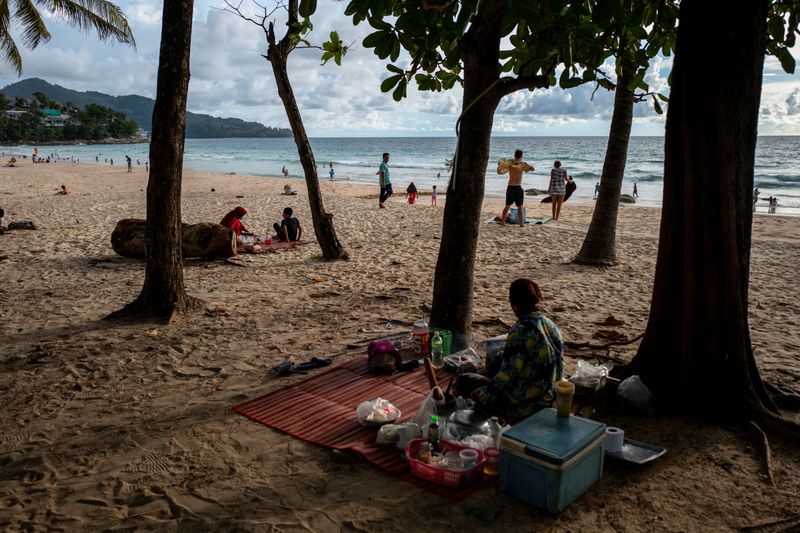By Jamie Freed
(Reuters) - Asia's gradual easing of international travel curbs is proving a welcome relief for the region's hard-hit tourism operators slowly opening up to visitors from around the world - with one giant exception.
China, previously the world's largest outbound tourism market, is keeping international air capacity at just 2% of pre-pandemic levels and has yet to relax tight travel restrictions as it sticks to zero tolerance for COVID-19.
That has left a $255 billion annual spending hole in the global tourism market for operators such as Thailand's Laguna Phuket to try and fill.
Managing director Ravi Chandran says Laguna Phuket's five resorts have shifted their marketing focus to Europe, the United States and United Arab Emirates to make up for the loss of Chinese visitors, who accounted for 25%-30% of its pre-COVID business.
"Up to today, we have not done significant marketing or promotion in China ... because we don't feel anything coming our way," Chandran said. The pandemic has cost Thailand an estimated $50 billion a year in tourism revenue and Chinese were above-average spenders based on tourism ministry data. Thailand hopes to receive 180,000 foreign tourists this year, a fraction of around 40 million it received in 2019, as it opened places beyond Phuket to tourists on Monday.
Many experts expect China to keep such stringent measures such as up to a three-week quarantine for those returning home until at least the second quarter of next year and possibly then open gradually on a country-by-country basis.
"Destinations have to identify new source markets and learn how to market and cater to different cultures," Pacific Asia Travel Association (PATA) Chief Executive Liz Ortiguera said, citing the Maldives as a rare example of a successful pivot during the pandemic.
The string of islands in the Indian Ocean promoted itself heavily at trade shows and attracted more Russian and Indian visitors to its luxury resorts and sparkling waters.
China had been its greatest source of tourists before the pandemic but the Maldives saw overall arrivals in the first nine months of 2021 fall just 12% versus the same period of 2019.
"When we realised that Chinese travellers weren't coming to the Maldives any time soon, we switched our focus to other key markets including Russia," said a spokesperson for COMO Hotels and Resorts, which has two Maldives resorts.
CHINA TOURISM EVOLVES
Travel data firm ForwardKeys estimates it will take until 2025 for Chinese outbound travel to recover to pre-pandemic levels. That will also force airlines to re-evaluate their routes given its data shows 38% of Chinese tourists took foreign carriers in 2019. Even as Singapore, Thailand and Indonesia's Bali gradually open up for international travellers, Thai Airways and Garuda Indonesia are drastically shrinking their fleets as part of restructuring plans amid the absence of Chinese tourists.
When China does open its borders, industry surveys show a reluctance by many to travel internationally due to COVID-19 fears.
There has also been a boom in domestic holidays to Hainan Island which now offers duty free shopping in a threat to future visits to nearby destinations such as Hong Kong and South Korea.
"I honestly do not have much enthusiasm for international travel," said at Kat Qi, 29, a researcher in Beijing who travelled to Southeast Asia and Britain before the pandemic. "A lot of places that I wanted to visit are in less developed countries with gorgeous natural scenery and they tend to be the least vaccinated countries."
Her preference for natural scenery is also a trend emerging in surveys of Chinese travellers. Many are focused on the outdoors at a time when domestic camping holidays have become popular and tourism operators will need to adapt accordingly, experts say.
"The market will have changed so the Chinese people travelling in 2022 will be different from the Chinese travelling in 2019," said Wolfgang Georg Arlt, CEO of the China Outbound Tourism Research Institute. "I think the trends will go away from this shopping and rushing around."
Large group tours that have also fallen out of favour on domestic trips could also be a thing of the past, to be replaced by independent travel and smaller customised tours with family and friends, said Sienna Parulis-Cook, director of marketing and communications at marketing company Dragon Trail International.

"You might have organised travel and everything but it would be with a small group of people that you know, rather than 50 strangers on a tour bus," she said.
(Corrects firm's name and description in paragraph 17)